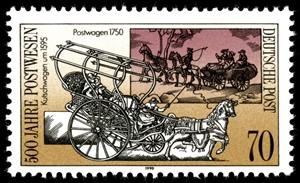Stamp: Carriages (to 1595), diligence (1750) (Germany, Democratic Republic 1990)
Carriages (to 1595), diligence (1750) (Germany, Democratic Republic 1990)
28 August (Germany, Democratic Republic ) within release 500 years international postal routes in Europe goes into circulation Stamp Carriages (to 1595), diligence (1750) face value 70 German pfennig
| Stamp Carriages (to 1595), diligence (1750) in catalogues | |
|---|---|
| Michel: | Mi:DDR 3356 |
| Yvert et Tellier: | Yt:DDR 2959 |
Stamp is horizontal format.
Also in the issue 500 years international postal routes in Europe:
- Stamp - Postman (c. 1486) face value 30;
- Stamp - The small postrider (Dürer, 16th century), Postman (1590) face value 50;
- Stamp - Carriages (to 1595), diligence (1750) face value 70;
- Stamp - Railway mail cars (1872 and 1900) face value 100;
Stamp Carriages (to 1595), diligence (1750) it reflects the thematic directions:
The mail or post is a system for physically transporting documents and other small packages; or, the postcards, letters, and parcels themselves. A postal service can be private or public, though many governments place restrictions on private systems. Since the mid-19th century national postal systems have generally been established as government monopolies with a fee on the article prepaid. Proof of payment is often in the form of adhesive postage stamps, but postage meters are also used for bulk mailing. Modern private postal systems are typically distinguished from national postal agencies by the names "courier" or "delivery service". Postal authorities often have functions other than transporting letters. In some countries, a postal, telegraph and telephone (PTT) service oversees the postal system, in addition to telephone and telegraph systems. Some countries' postal systems allow for savings accounts and handle applications for passports.
An anniversary is the date on which an event took place or an institution was founded in a previous year, and may also refer to the commemoration or celebration of that event. For example, the first event is the initial occurrence or, if planned, the inaugural of the event. One year later would be the first anniversary of that event. The word was first used for Catholic feasts to commemorate saints. Most countries celebrate national anniversaries, typically called national days. These could be the date of independence of the nation or the adoption of a new constitution or form of government. The important dates in a sitting monarch's reign may also be commemorated, an event often referred to as a "Jubilee".


